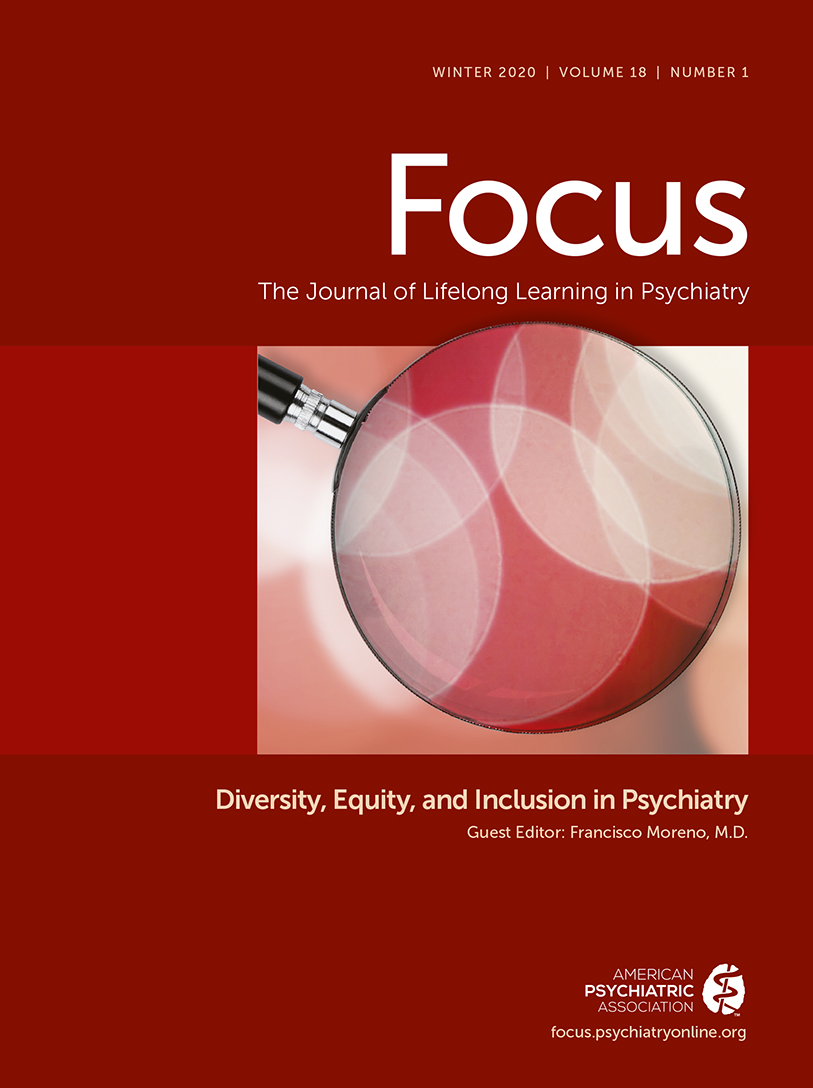Diversity, Equity, and Inclusion in Psychiatry
People of the United States may debate the value and desirability of American diversity or the global and historical context contributing to national and local variations in racial, ethnic, socioeconomic, and cultural composition. However, the anticipated trajectory of this country’s increasing diversity, as well as the inequities in social determinants, expressions of health, and experiences with health care, are well-accepted realities requiring urgent attention. Everyone experiences multiple elements of identity, which are fluid, intersecting, and essential aspects of our personhood. Given our undeniably pluralistic society, the study and practice of psychiatry requires recognizing the continuum and spectrum of differences and their impact on personal experiences, our different environments and contexts, and their complex interactions. All may influence the individual’s vulnerabilities and resilience, attribution of experiences, conceptualizations of symptoms, help seeking, and outcome expectations.
This issue of Focus is dedicated to addressing diversity equity and inclusion in psychiatry. It is meant to serve as a resource to assist behavioral health providers and leaders to best understand and serve a richly diverse patient population that will invariably include individuals with backgrounds, preferences, and needs that differ from their own. Included is an introduction to the topic of diversity equity and inclusion in psychiatry (1) and various well-informed contributions on timely and relevant topics, such as the social determinants of mental health (2); strategies to increase our awareness and recruit our efforts to improve access and quality of care for individuals who are psychiatrically underserved (3); strategies to improve our sensitivity and skill to approach the care of individuals from various identity groups by incorporating principles like “affirmative care,” “trauma-informed care and cultural humility” in the service of those from minoritized communities (4, 5); and an updated critique of the DSM-5 Cultural Formulation Interview (6) and its various elements, inviting a routine integration of this tool to enhance the assessment and planning approach for all individuals.
We hope this issue will also serve as a call to action to our individual and collective commitment to addressing the mental health of everyone.
1 : Diversity and inclusion in psychiatry: the pursuit of health equity. Focus 2020; 18:2–7Abstract, Google Scholar
2 : The social determinants of mental health: psychiatrists’ roles in addressing discrimination and food insecurity. Focus 2020; 18:25–30Link, Google Scholar
3 : Challenges and opportunities to meet the mental health needs of underserved and disenfranchised populations in the United States. Focus 2020; 18:16–24Link, Google Scholar
4 : Affirmative care across cultures: broadening application. Focus 2020; 18:31–39Abstract, Google Scholar
5 : Trauma-informed care and cultural humility in the mental health care of people in minoritized communities. Focus 2020; 18:8–15Abstract, Google Scholar
6 : Update on the Cultural Formulation Interview. Focus 2020; 18:40–46Abstract, Google Scholar



